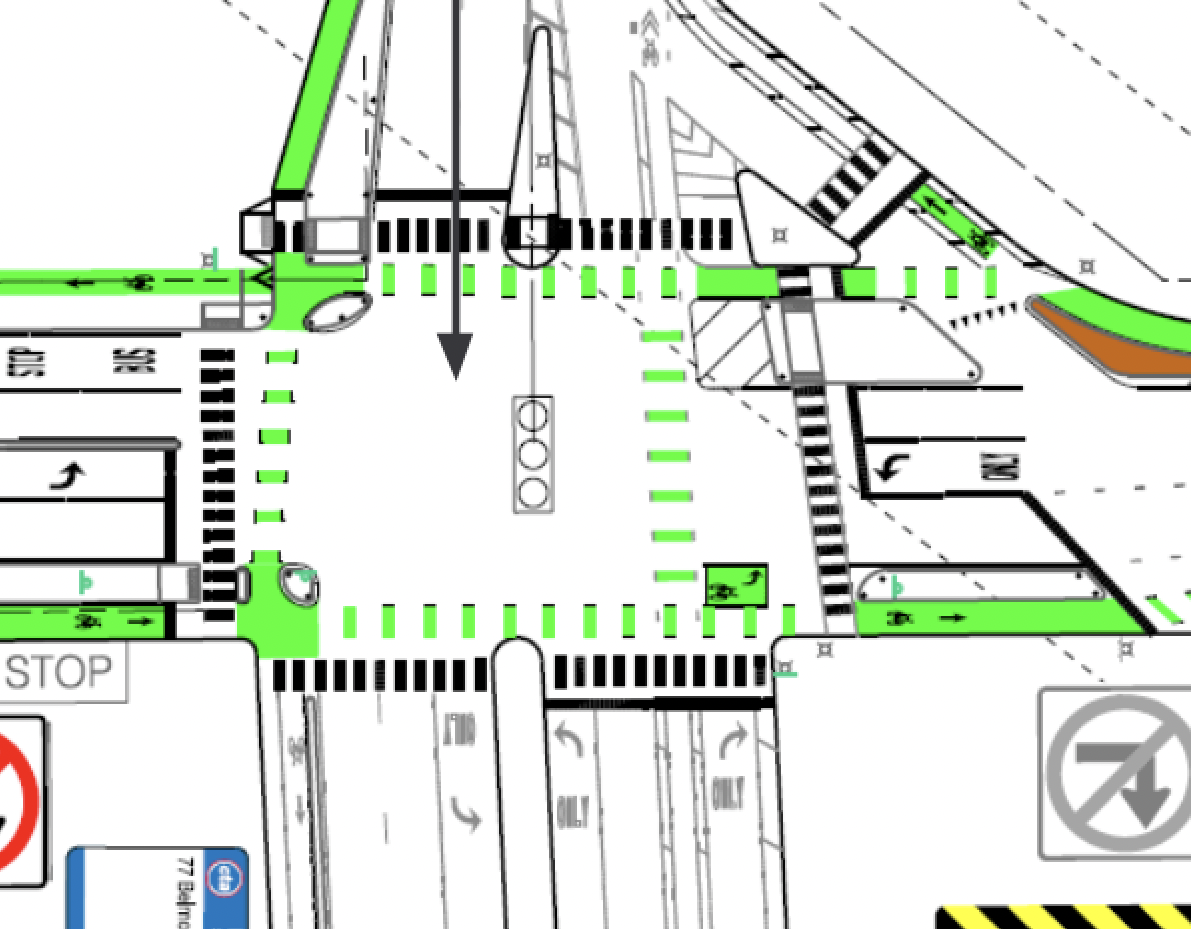Chicagoans who ride bikes have long been asking the city for safety cycling conditions on Belmont Avenue (3200 N.), an important east-west route. As of early 2015, Belmont was slated to get a road diet with buffered lanes from Western Avenue (2400 W.) to Kedzie Avenue (3200 W.), but that project was cancelled after the CTA pushed back on that plan, arguing it would slow down buses on the #77 Belmont bus route.
Calls for making Belmont more bike-friendly intensified after the 1.5-mile 312 RiverRun trail system, running between Belmont and Montrose Avenue (4400 N.) was completed last August. What's the point of a low-stress bike route, advocates asked, if you have to ride on a dangerous high-speed road with no bike lanes at all, lets alone protected ones, to access it from the south?
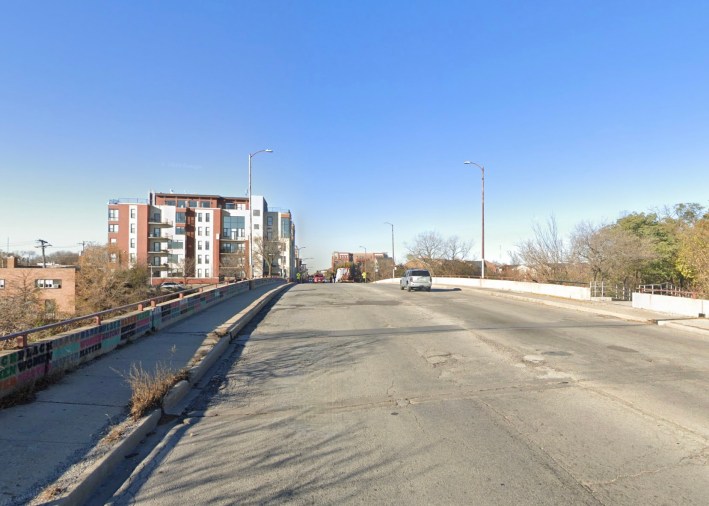
Fortunately there was some good news on this front last week. At a 35th Ward community meeting introducing 2022 infrastructure projects, Alderperson Carlos Ramirez-Rosa announced that an upcoming Complete Streets makeover of Belmont on the 1.25-miles segment between Western and Kimball Avenue (3400 W.) will include curb-protected bike lanes. That will make it much safer and more comfortable to ride to the RiverRun, and help address the North Side's dearth of east-west bike lanes that cross the Chicago River.
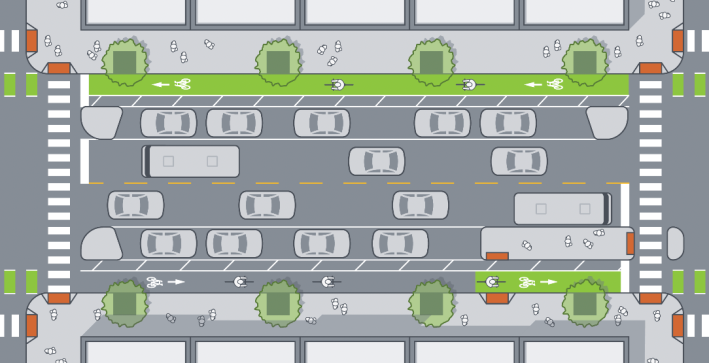
During the presentation, Chicago Department of Transportation bike and pedestrian manager David Smith said travel lanes along Belmont will be “right sized” to encourage safer driving speeds. New sidewalk bump-outs will shorten pedestrian crossing distances and improve sight lines.
Bus-boarding islands, which will allow bus drivers to pick up passengers from the travel lane, eliminating time wasted merging in and out of traffic, Smith said. Transit signal priority will be implemented to help speed up #77 buses and improve reliability. There will also be a short bus lane segment for westbound buses as they approach the Blue Line station at Kimball.
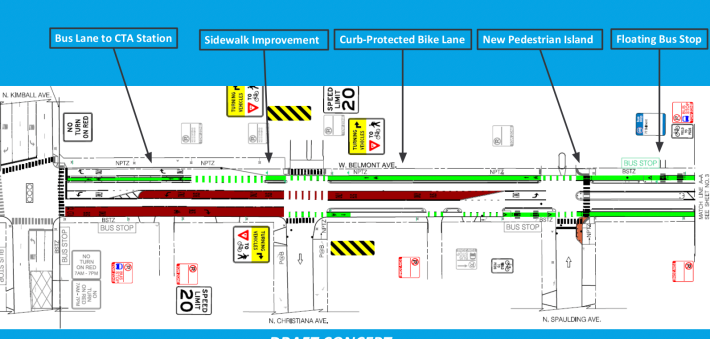
The renderings also indicate that trees will be planted along the sidewalk. That will bring some much-needed shade once the trees mature.
Several other sustainable transportation and public space projects are on the horizon in the 35th Ward, which is comprised of parts of Hermosa, Logan Square, Avondale, Albany Park, and Irving Park. The mile-long stretch of Kedzie Avenue between Addison Street (3600 N.) and Diversey Avenue (2800 N.) is also getting curb protected bike lanes. And as part of the Belmont and Kedzie projects, the complex, dangerous Belmont/Kedzie intersection, located under the Kennedy Expressway and Metra's Union Pacific North line, is getting walk/bike/transit improvements.
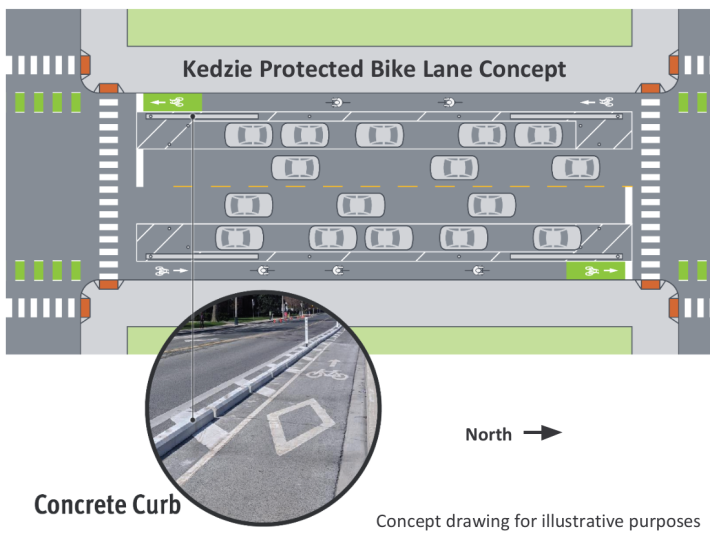
CDOT is even making an attempt at building a proper Dutch-style protected intersection at Belmont/Kedzie. For example, the oval traffic islands visible at the northwest and southwest corners of the intersection in the rendering below will help prevent right-turning drivers from striking people on bikes, a type of crash known as the "right-hook." Read a full explanation of how protected intersections work, and why Chicago should be building them everywhere, in this Streetsblog post.
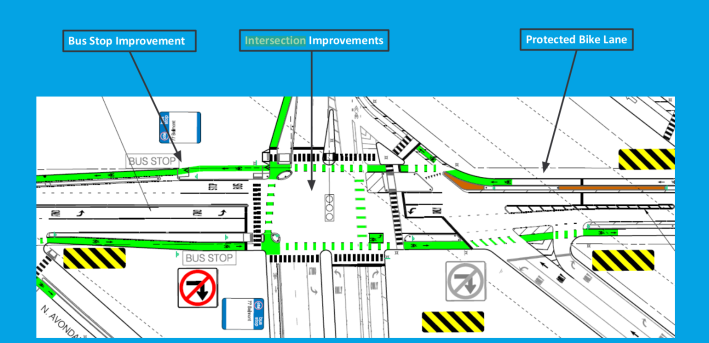
Milwaukee Avenue between Belmont and Logan Boulevard (2600 N.) will only receive dashed "advisory" bike lanes. Protected lanes were originally proposed, which would have involved converting a significant number of car parking spaces. It's disappointing that ,in order to appease drivers, maintaining easy parking was prioritized above preventing drivers from striking bike riders. That's especially troubling when you know that two people biking were recently killed by motorists at Milwaukee and Kilbourn Avenue (4600 W.), just a mile northwest of Belmont/Milwaukee. (That stretch of Milwaukee will be getting curb-protected lanes later this summer.)
David Smith argued that dashed bike lanes are better than nothing, pointing to data from the city's first dashed bike lane installation on Milwaukee Avenue between Division and Armitage. He said the dashed lanes helped reduce crashes by 16 percent between 2016 and 2018. Bike crashes dropped by 23 percent. He said there was also a nearly 50 percent reduction in speeding.
On the bright side, many other upgrades are coming to Milwaukee between Belmont and Logan in conjunction with the bold redesign of the Logan/Kedzie/Milwaukee traffic circle, which contains green space and the Illinois Centennial Monument pillar. This street remix includes pedestrianizing the segment of Milwaukee that crossed the circle, and rerouting Kedzie next to the Logan Square Blue Line station to create a new plaza called La Placita
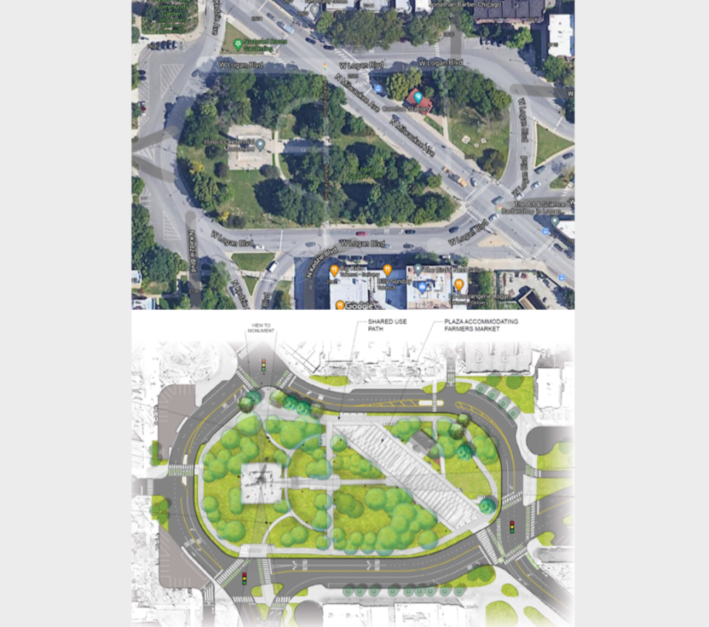
The Milwaukee corridor between Belmont and Logan will get 19 raised sidewalks, which will hopefully slow drivers and improve visibility and safety for people crossing the street. Pedestrian safety will be further improved with 70 curb bump-outs, including 27 on Milwaukee, six on Kedzie Ave, and 37 on side streets. 85 new trees will be planted.
Extra-large sidewalk extensions will be built on Milwaukee to accommodate additional outdoor seating. Businesses will have to apply to the Chicago Department of Business Affairs and Consumer Protections for permit in order to reserve these new spaces for their customers. In contrast, "People Spot" on-street seating areas set up in the parking lanes will be offered as a public amenity where anyone can sit in the warmer months.
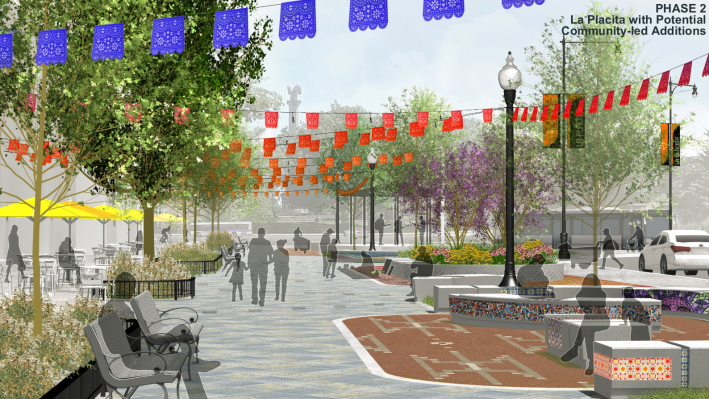
Lastly, Smith unveiled renderings of La Placita, which will be located north of the traffic circle. Designs for the plaza include visual influences from Mexican, Puerto Rican, and Peruvian culture, honoring the longtime presence of Latino cultures in Logan Square, in an effort to ensure this legacy is not erased as the neighborhood faces gentrification and housing displacement pressures.
